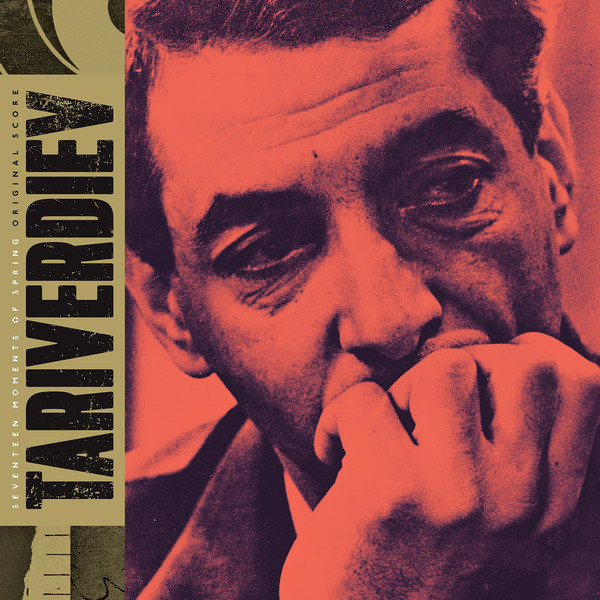
17 Moments Of Spring
Mikael Tariverdiev
FOR RUSSIA – WITH LOVE – A man enters a café, takes a drink and sits smoking. He watches as a woman enters with another man. They order coffee and converse at a table. Her companion says something quietly to her and gets up to leave. Alone, she looks around the café and suddenly sees the first man. For the next six minutes, they look at each other, around each other, through each other. Not a word is exchanged. The woman’s companion returns and leads her away.
£12.00 – £16.00
This silent sequence, accompanied only by music, is from Seventeen Moments of Spring, a 1972 Soviet twelve part television series. The scene was resisted by the producers and included only on the insistence of the director Tatyana Lioznova, but it became one of the best-known in Russian film history, and its piano score one of the best-known pieces of Russian cinematic music. The series tells the story of a Soviet spy (portrayed by the actor Vyacheslav Tikhonov) operating undercover in Nazi Germany as military officer Max Otto von Stierlitz. Stierlitz is on a covert mission to disrupt secret negotiations aimed at forging a pact between Germany and the Western Allies. He is sometimes referred to as ‘the Soviet James Bond’ and there are some correspondences, despite the World War II setting: both Bond and Stierlitz work for their respective countries’ secret service agencies and both, in various ways, reflect their cultures’ idealised alpha males. But whilst Bond, is a hard-drinking, hard-loving, wisecracking free agent, Stierlitz is restrained, faithful to hiswife, intellectual and modest. He spends much time looking out of windows rather than crashing through them.
There is a further link in that Seventeen Moments was made partly in response to the way the KGB was typically portrayed abroad in works such as the Bond series (where it appears as SMERSH). On broadcast, Seventeen Moments was immediately immensely popular with an estimated audience of between 50 and 80 million viewers for each episode. Crime rates dropped significantly during the broadcasts, city streets were empty and power stations had to increase production to cope with a surge in the demand for electricity for TV sets. It is said that Brezhnev moved meetings of the Central Committee of the Communist Party in order not to miss an episode and that Vladimir Putin’s decision to join the KGB was influenced by watching the series when young. It became the most successful Soviet espionage thriller ever made. It was rebroadcast annually in the Soviet Union and throughout the Warsaw Pact nations, and is still regularly shown in Russia where it remains one of the most popular television series of all time.
Without any doubt, the score by Mikael Tariverdiev contributed to this huge success. He wrote it after some initial reluctance to be involved but its popularity catapulted him to national fame. ‘Somewhere Far Away’ and “Moments’, remain some of the best-known and well-loved cinematic songs of the era. The main theme and his piano underscore to that famous café scene where Stierlitz and his wife meet-but-don’t-meet must have surely captured the haunted longings and romantic poignancy of a generation of Soviet citizens who had suffered their own forced separations, displacements, silences and losses.
The score presented here follows the narrative arc of the series’ story. It has been re-mastered from transfers made from original tapes in the Tariverdiev apartment in Moscow.
The download and CD versions contain three additional tracks never before released – even in Russia – including the much-loved Waltz for Gaby.
Tracklist
2. Somewhere Far Away
3. The Echo Of War
4. Black & White Rhythm
5. Moments
6. Prelude For Ket
7. Farewell Station
8. Roads
9. Night Patrol
10. Spring Morning
11. Couple In A Café
12. Twilight In Berlin
13. Escape
14. Do Not Think Of The Seconds From The Height
Description
This silent sequence, accompanied only by music, is from Seventeen Moments of Spring, a 1972 Soviet twelve part television series. The scene was resisted by the producers and included only on the insistence of the director Tatyana Lioznova, but it became one of the best-known in Russian film history, and its piano score one of the best-known pieces of Russian cinematic music. The series tells the story of a Soviet spy (portrayed by the actor Vyacheslav Tikhonov) operating undercover in Nazi Germany as military officer Max Otto von Stierlitz. Stierlitz is on a covert mission to disrupt secret negotiations aimed at forging a pact between Germany and the Western Allies. He is sometimes referred to as ‘the Soviet James Bond’ and there are some correspondences, despite the World War II setting: both Bond and Stierlitz work for their respective countries’ secret service agencies and both, in various ways, reflect their cultures’ idealised alpha males. But whilst Bond, is a hard-drinking, hard-loving, wisecracking free agent, Stierlitz is restrained, faithful to hiswife, intellectual and modest. He spends much time looking out of windows rather than crashing through them.
There is a further link in that Seventeen Moments was made partly in response to the way the KGB was typically portrayed abroad in works such as the Bond series (where it appears as SMERSH). On broadcast, Seventeen Moments was immediately immensely popular with an estimated audience of between 50 and 80 million viewers for each episode. Crime rates dropped significantly during the broadcasts, city streets were empty and power stations had to increase production to cope with a surge in the demand for electricity for TV sets. It is said that Brezhnev moved meetings of the Central Committee of the Communist Party in order not to miss an episode and that Vladimir Putin’s decision to join the KGB was influenced by watching the series when young. It became the most successful Soviet espionage thriller ever made. It was rebroadcast annually in the Soviet Union and throughout the Warsaw Pact nations, and is still regularly shown in Russia where it remains one of the most popular television series of all time.
Without any doubt, the score by Mikael Tariverdiev contributed to this huge success. He wrote it after some initial reluctance to be involved but its popularity catapulted him to national fame. ‘Somewhere Far Away’ and “Moments’, remain some of the best-known and well-loved cinematic songs of the era. The main theme and his piano underscore to that famous café scene where Stierlitz and his wife meet-but-don’t-meet must have surely captured the haunted longings and romantic poignancy of a generation of Soviet citizens who had suffered their own forced separations, displacements, silences and losses.
The score presented here follows the narrative arc of the series’ story. It has been re-mastered from transfers made from original tapes in the Tariverdiev apartment in Moscow.
The download and CD versions contain three additional tracks never before released – even in Russia – including the much-loved Waltz for Gaby.
